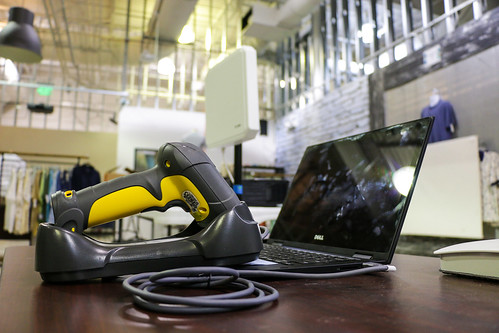Auburn RFID Lab prepares to launch CHIP Project, a game-changer in retail and apparel supply chain
Article body
Partnerships and working together are vital in solving problems. At Auburn University, the Radio Frequency Identification, or RFID, Lab works with industry partners to develop new ways to efficiently move products, such as the latest fashionwear, through the supply chain to consumers.
The lab’s soon-to-be-implemented CHIP Project will be a way for retail and apparel companies to communicate with their suppliers about their product inventories through a common record of information. It will be a blockchain—data maintained across several computers linked in a peer-to-peer network—in the flow of products.
CHIP, an acronym for Chain Integration Pilot, is the first supply chain project that will integrate item-level data streams—information pulled from the attached RFID tags—from various stakeholders into a blockchain network.
“We’re very proud of the students here for leading the very first blockchain project for item-level retail,” said Justin Patton, RFID Lab. “In a few weeks you’ll be able to see the first items whose data was shared over blockchain, framed and on display down at the lab for visitors. This reinforces Auburn as the go-to university for retail innovation internationally, and the best graduating students available in the field.”
Since the project began in June 2018, CHIP has signed up 21 partners from a variety of industries that will participate directly in the proof-of-concept phase and support the project as a collective working group.
Another key step for the RFID Lab was joining Hyperledger, a global collaboration hosted by the Linux Foundation that aims to advance cross-industry blockchain technologies. Hyperledger is a multi-venture, multi-stakeholder effort that includes various enterprise blockchain and distributed ledger technologies.
As a new member, Auburn’s RFID Lab joins industry leaders in finance, banking, Internet of Things, supply chain, manufacturing and technology, and will be positioned to inform and influence the direction and application of blockchain technologies across the globe.
Due to the sophistication of current supply chains, data exchange between partners can be challenging, as proven by Project Zipper, a national data exchange study conducted by the RFID Lab since 2017. As a result, supply chain touch points and the data they generate are often isolated from one another—a problem that the CHIP project aims to address by connecting the digital dots on a global scale. By capturing and contributing item-level data streams into a blockchain solution, an item-level record of product information will be created for goods flowing from one supply chain stakeholder to the next.
“By conducting the CHIP project and incorporating industry stakeholders around the globe, the Auburn University RFID Lab aims to encourage adoption of serialized data and blockchain technologies and usher in the next generation of supply chain innovation,” Patton said.
The first phase of the CHIP project is expected to be complete this December.
Media contact: Joe McAdory
Related Media
Media interested in this story can contact Communications Director Preston Sparks at (334) 844-9999 or preston.sparks@auburn.edu.
The Raymond J. Harbert College of Business at Auburn University is a nationally ranked hub of undergraduate, graduate and continuing business education that is inspiring the next generation of business leaders. World-class faculty deliver unparalleled academic rigor in the classroom, while research-driven scholarship advances thought leadership and best practice in emerging business disciplines. The college’s alumni, friends and corporate partners actively support and engage faculty and students to integrate business theory with practical experience and instill the level of professional proficiency and personal integrity demanded by employers around the globe. Learn more at harbert.auburn.edu.






